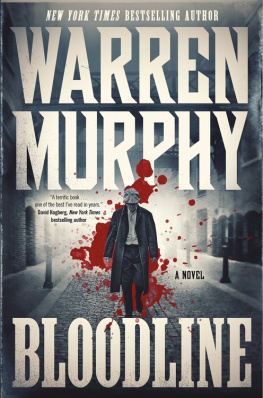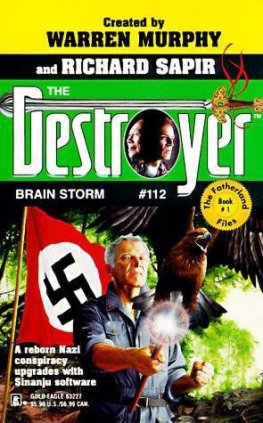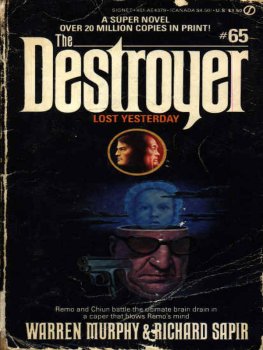DESTROYER 37: BOTTOM LINE
by Richard Sapir and Warren Murphy
CHAPTER ONE
If distrusting people had been an Olympic event, Zack Meadows would have scored perfect tens.
He did not trust jockeys with Italian names. He was convinced they sat around in the clubhouse, hours before the races, deciding who was going to win what. How they always managed to select winning horses on which Zack Meadows didn't have a bet, he ascribed to simple Mediterranean devious-ness.
He didn't trust policemen. He had never met a cop who wasn't on the take and who didn't have a summer house. Nor did he trust civil service examiners. Because three times they had turned him down for appointment to the police department, a job he wanted badly so he could go on the take and buy a summer house. He also didn't trust real estate people who sold summer houses.
Zack Meadows did not trust women who came to him and said they wanted their husband followed because he was running around with another woman. This usually meant the wife was hooked on another man at the moment and was thinking of divorce but would probably soon change her mind and try to beat Meadows out of his fee. Meadows handled this
by first following the wife who hired him to find out who she was running around with, then if she dropped him later, he would peddle the information to the husband.
Nor did he trust swarthy people, guys who sold hot watches, blacks, liberals, cab drivers, Jews, doctors, bookies, life insurance companies, American car manufacturers, foreign car manufacturers, and places that claimed they could replace your car's muffler in twenty minutes for $14.95.
Not that he regarded himself as distrusting. He thought he was softhearted, the original patsy, just occasionally working his way toward realism. Being suspicious was just part of an urban survival kit in dog-eat-dog New York City. Zack Meadows sometimes thought he might be happier living in the north woods in a log cabin. But he didn't trust well water and who in his right mind would trust animals not to attack when your back was turned?
So why did he trust this nervous little man who sat in front of Meadows's cigarette-scarred desk, twisting his gloves nervously hi his hands, and having difficulty meeting Meadows's bleary-eyed gaze? Particularly when the man's story made no sense; he had trouble telling it, and after ten minutes he still hadn't been able to get it out.
"Now let's try again," Meadows said. "You're starting to eat up a lot of time and I'm not making any money sitting here listening to you yap."
The little man sighed. He was delicate appearing with long thin hands and the skin of his fingers bore brown blotches as if he made his living working with chemicals.
"Have you ever heard of the Lippincott family?" he asked.
"No," said Meadows. "The last car I owned was built by one of their companies and I bought gas from then: oil companies and I'm in hock to six of their banks and if I ever get any time off I watch television on networks that they own. The only thing I don't have is pictures of them on my money and I figure that'll be next when they buy the rest of the country. Of course, I heard of the Lippincott family, you think I'm stupid?" Meadows took a deep breath that raised his shoulders and expanded his fatty cheeks. Sitting behind his desk, he looked like an outraged blowfish.
The small man seemed to tremble. He raised a hand as if to ward off an attack.
"No, no, I didn't mean that," he said quickly. "That's just a way of speaking."
"Yeah," growled Meadows. He wondered if this guy would be done before it was time for him to call his bookie. There were Italian jockeys riding in both the first and second today at Behnont. It was a sure daily double.
"Well, the Lippincotts," the man said nervously. He glanced toward the door of the seedy third-floor office and then leaned closer to Meadows. "Somebody is trying to kill them."
Meadows sat back in his squeaking swivel chair and folded his arms. He assumed his expression of disgust. "Sure," he said. "Who? England? France? One of them nigger countries that change their name every week? Who the hell can kill the Lippincotts without declaring war on America first?"
"But someone is," the little man said. His eyes met Meadows directly. Meadows looked away.
"So what are you telling me for?" he asked. "What's it to me or you or anybody?"
"Because the Lippincotts don't know about it but I know. I know who's going to try to kill them."
"And?"
"I think saving their lives ought to be worth a lot of money to us."
"Why us?" asked Meadows.
"Because I can't do it myself," the little man said. Sentence by sentence, his voice was getting stronger. His hands were no longer wringing out his gloves. It was as if, once having taken the first step, he was committed and with the commitment came an end to nervousness about what he was doing.
His name was Jasper Stevens. He was a medical technician and he worked for a private research laboratory that was funded by the Lippincott Foundation. As he talked, Meadows tried to picture the Lippincott family in his mind.
There was the father, Elmer Lippincott. He was eighty years old but nobody had told him, so he acted like thirty. He had just married some young blonde. He had made his fortune starting as a roustabout in the oil fields and as he admitted in later Ufe, "I got rich because I was a bigger bastard then anybody else there." He had the face and eyes of a hawk. The press sometimes referred to him as an eccentric but that wasn't really true. It was just that the elder Lippincott, dubbed "The First," did just what he damn well pleased.
He had three sons. Elmer Jr. was called "Lern," and he was a kind of superboss who handled all the
4
Lippincott manufacturing interests: car companies, television factories, modular home construction.
Randall was the second son, in charge of the family's finances. He ran the banks, the mutual funds, the brokerage houses, and the overseas investment companies.
Douglas, the youngest son, was the diplomat. He testified before the government when they were discussing tax incentives and balance of payments and how to improve trade. He dealt with the heads of foreign countries when the Lippincotts wanted to start some new oil exploration or build a new overseas auto plant.
Meadows was surprised at how much he remembered about them. He had seen an article about them in one of those people magazines a month earlier when he had gotten a haircut. It was an old magazine, without a cover, on the barber's table. Inside there was a picture of the Lippincott family.
There was Elmer the First, seated in the back, with his new blonde young wife standing by his side. And standing on the other side of the chair were the three Lippincott sons. Meadows had been surprised at how little they looked like their father. There was no steel in their faces, no hardness. They had the look of soft, well-fed men, and he remembered having thought that it was a good thing that the old man had been the oil roustabout and not his sons because they didn't look like they could fight their way in out of the rain. Except for maybe the youngest one, Douglas. At least he had a chin.
It took two hours for Jasper Stevens to tell his . story to Zack Meadows because it had a lot of technical terms in it and Meadows kept going back over
it and over it, trying to get it clear in his mind, but also trying to trip Stevens up in an untruth.- But the man's story was consistent. Meadows found himself believing him.
Finally, Meadows said "So why'd you come to me?"
Jasper Stevens smiled. "I think somebody should be willing to pay handsomely for all the information I've got. And I don't know how to go about it."
Meadows laughed and Stevens winced. "Information? You don't have anything. You've got a few facts and a couple of names and some ideas. But you don't have any evidence. Nothing written down. No reports. Nothing that couldn't be denied by somebody just saying that you're a liar."
Next page



